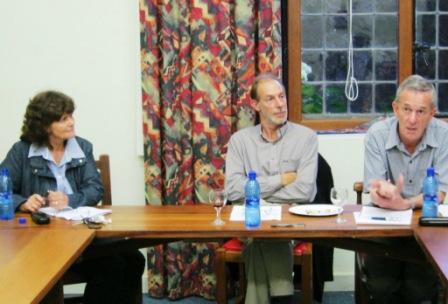
What would three people, working in the fields of Anthropology, English and Statistics, have to say to one another? Well, rather a great deal, it turns out. Prof Dirk Klopper (HoD English), Prof Chris De Wet (Anthropology), and Prof Sarah Radloff (Statistics) held a very interesting discussion on the topic “Challenges and Opportunities in Interdisciplinary Collaboration: a Perspective from the Humanities” recently.
Prof De Wet opened by saying that Anthropology “is not simply the study of homo sapiens, but the systematic pursuit of the understanding of ourselves as human beings”. This includes the study of different groups and the boundaries or overlaps with other groups and our primate cousins. “Disciplines, ie academic disciplines, similarly are bounded imaginaries, creative constrictions, for making meaning. It becomes interesting and rewarding – although complex and difficult– when we start to reach out across those meanings, enabling disciplinary constrictions in an interdisciplinary manner.”
He described the discourse of “bounded imaginaries” as “a fertile locus” to navigate the boundaries between different disciplines. “In both literature and anthropology, we are confronted by the amazing manifestation of diversity of expression and by the puzzle of where it comes from,” he said.
In his talk, Prof Klopper, an avid admirer of JM Coetzee, naturally referred to the memoir Youth where the protagonist John discovers William Burchell’s Travels in the Interior of Southern Africa (1822) in the BritishMuseum. This creates a comparison between “what is putatively ‘real’ in travel writing to what has an ‘aura of truth’ in literary writing”.
This book within a book (“the fiction of the real”) is an interesting comment on knowledge. “The knowledge he seeks is in the nature of a horizon, a constitutive limit. It is not contained; he says, ‘in history books, since it belongs to the mundane… the common knowledge of a bygone world,’ knowledge too humble to know it is knowledge.”
Klopper juxtaposed the character John’s “anthropology of literary discourse” with the anthropologist James Clifford’s “concern with discursive nature of anthropology” and ethnographic authority.“Both concern themselves with embodied human experience, an experience that emanates, on the one hand, from bodily being, from sensation and feeling as much as from thought, and is embodied, on the other hand, in discourse, in the dialogical communication between subjects who may be located in this discourse that connects them, who may be constituted by it, quite differently.”
Prof Sarah Radloff then spoke about her interdisciplinary work, mainly comprising collaborative research with 26 departments at Rhodes and this has led to international collaborative research with colleagues from 19 countries. Humble and soft-spoken, she described it as a matter of “give, take and share” as she has learned so much through being able to assist in the research of others.
Collecting and processing quantitative data sometimes takes years to complete and the researcher doesn’t always find that there is sufficient evidence from the data to support the research hypotheses. Radloff joked: “In God we trust, all others must bring data!” which naturally forms the backbone of all quantitative research. However she maintained that she is aware that data are “only a representation of the truth and are not the absolute truth”. She admits that many statistical procedures often fall under assumptions (boundaries), “which are fairly in-concrete”.
The most tangible benefit of interdisciplinary collaboration is to add value and benefit to society. She used the example of the research she has been conducting with Prof Randall Hepburn on classification and biogeography of the honeybees of Africa and Asia. This no doubt will have a significant effect in an agricultural context, especially in regard to plant pollination, honeybee breeding and genetics in the face of an apparently imminent collapse in Europe and North America, and the collation of the relevant world literature in apiculture. It is this kind of knowledge creation and transfer that has also enhanced her vision as a teacher and supervisor, enabling her to apply theory to particular situations from southern Africa to China and Thailand.
Story and picture by Anna-Karien Otto.
